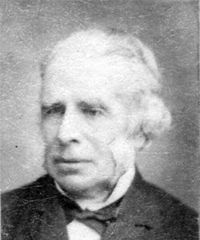Related Research Articles

Sir Stuart Alexander Donaldson was the first Premier of the Colony of New South Wales.

Sir James Martin, QC was three times Premier of New South Wales, and Chief Justice of New South Wales from 1873 to 1886.

Sir Alexander Stuart was Premier of New South Wales from 5 January 1883 to 7 October 1885.

Sir Arthur Renwick was an Australian physician, politician and philanthropist.
Sir James Graham was a Scottish-born physician and politician, active in Australia. He was Mayor of Sydney in 1901.
Cumberland was an electoral district of the Legislative Assembly in the Australian state of New South Wales from 1856 to 1859, in the rural part of Cumberland County, which includes Sydney. It included all of the county south of Parramatta Road and the Great Western Highway, except for the urban electorates of Sydney (City), Sydney Hamlets, Parramatta and Cumberland Boroughs, which included Liverpool and Campbelltown. It elected two members simultaneously, with voters casting two votes and the first two candidates being elected.

Sir William McMillan was an Australian businessman and politician. He was a member of the first federal parliament and served as deputy leader of the Free Trade Party under George Reid, but served only a single term before resigning. He had earlier served in the Parliament of New South Wales, including as Colonial Treasurer, and was prominent in the movement for Federation. He was born in Ireland and became a successful businessman in Australia after moving to Sydney at the age of 18.
Members of the New South Wales Legislative Assembly who served in the ninth parliament of New South Wales held their seats from 1877 to 1880.</ref> The 1877 election was held between 24 October and 12 November 1877 with parliament first meeting on 27 November 1877. There were 73 members elected for 53 single member electorates, 6 two member electorates and 2 four member electorates. Premiers during this parliament were Sir John Robertson until 18 December 1877, James Farnell from 18 December 1877 until 21 December 1878 and Sir Henry Parkes from 21 December 1878. The Speaker was Sir George Allen.
The Stuart ministry was the 20th ministry of the Colony of New South Wales, and was led by the Honourable Sir Alexander Stuart. Stuart was elected to the New South Wales Legislative Assembly in 1874.
John Davies , was a member of the Parliament of New South Wales.
James Norton Jr.,, was a solicitor and member of the New South Wales Legislative Council.

William Adams Brodribb was an Australian pastoralist and politician.
Sydney Burdekin was an Australian politician.
Marshall Burdekin was an Australian politician.
Cumberland South Riding, an electoral district of the Legislative Assembly in the Australian state of New South Wales was created in 1856 and abolished in 1859.
A by-election was held for the New South Wales Legislative Assembly electorate of East Macquarie on 15 August 1879 because of the resignation of William Suttor Jr.
East Sydney, an electoral district of the Legislative Assembly in the Australian state of New South Wales was created in 1859 and abolished in 1904.
A by-election was held for the New South Wales Legislative Assembly electorate of East Sydney on 29 May 1861 because Henry Parkes had resigned having accepted a government commission with a salary of £1,000 to travel to England to lecture on immigration with William Bede Dalley.
A by-election was held for the New South Wales Legislative Assembly electorate of East Sydney on 11 January 1883 because George Reid was appointed Minister of Public Instruction in the Stuart ministry. Such ministerial by-elections were usually uncontested and six ministers were re-elected unopposed. On this occasion a poll was required in East Sydney and Newtown. Copeland was defeated but regained a seat in parliament at the second by-election for East Sydney held on 23 January 1883. The six other ministers, Alexander Stuart (Illawarra), George Dibbs, Henry Cohen, James Farnell, Francis Wright (Redfern) and Joseph Abbott (Gunnedah), were re-elected unopposed.
A by-election was held for the New South Wales Legislative Assembly electorate of Glebe on 22 May 1873 because George Allen had been appointed Minister for Justice and Public Instruction in the first Parkes ministry. Such ministerial by-elections were usually uncontested.
References
- 1 2 "Sir Alexander Stuart (1824–1886)". Former Members of the Parliament of New South Wales . Retrieved 11 May 2019.
- ↑ Nairn, Bede; Rutledge, Martha. "Stuart, Sir Alexander (1824–1886)". Australian Dictionary of Biography . Melbourne University Press. ISSN 1833-7538 . Retrieved 9 September 2020– via National Centre of Biography, Australian National University.
- ↑ "Writ of election: East Sydney". New South Wales Government Gazette (416). 26 November 1879. p. 5253. Retrieved 9 September 2020– via Trove.
- ↑ Green, Antony. "August 1879 East Sydney by-election". New South Wales Election Results 1856-2007. Parliament of New South Wales . Retrieved 9 September 2020.